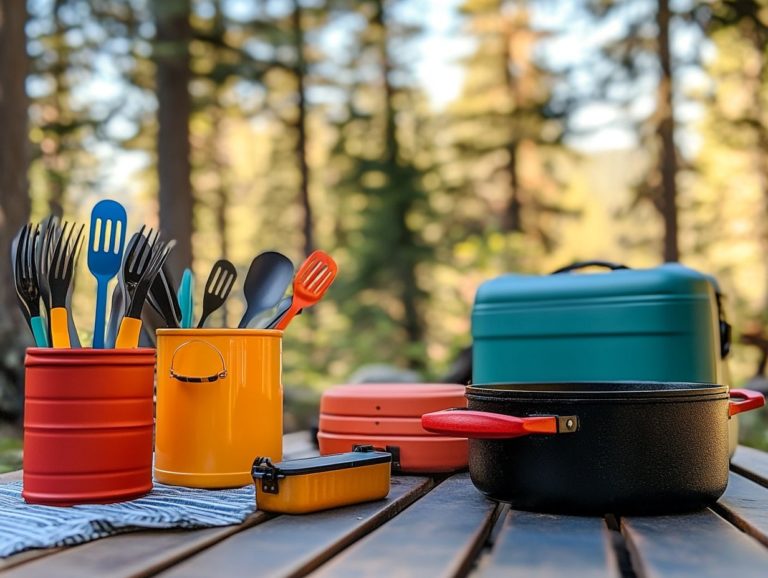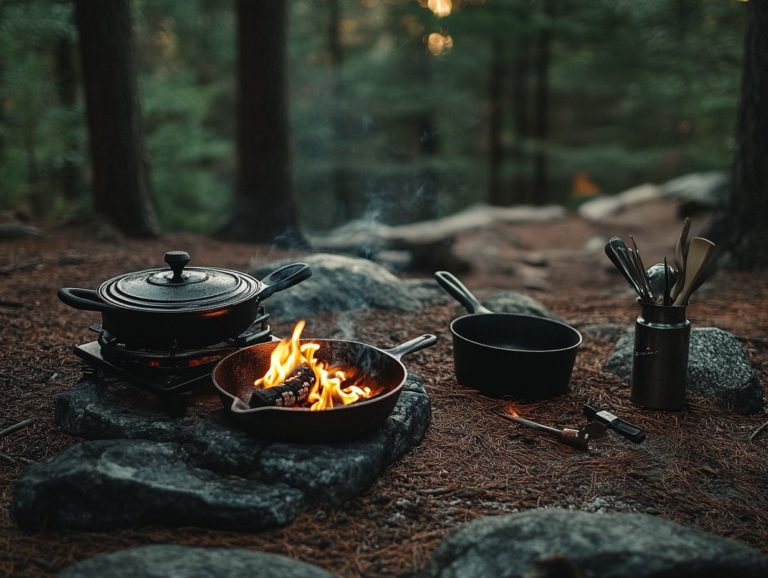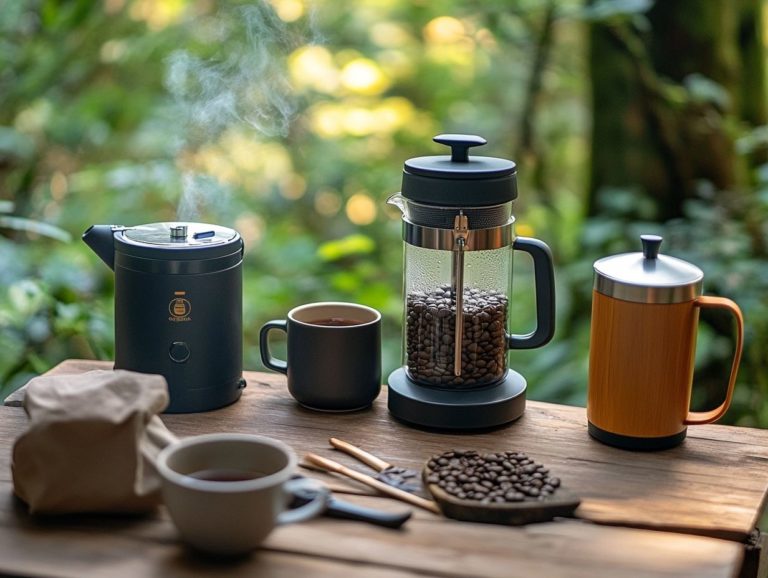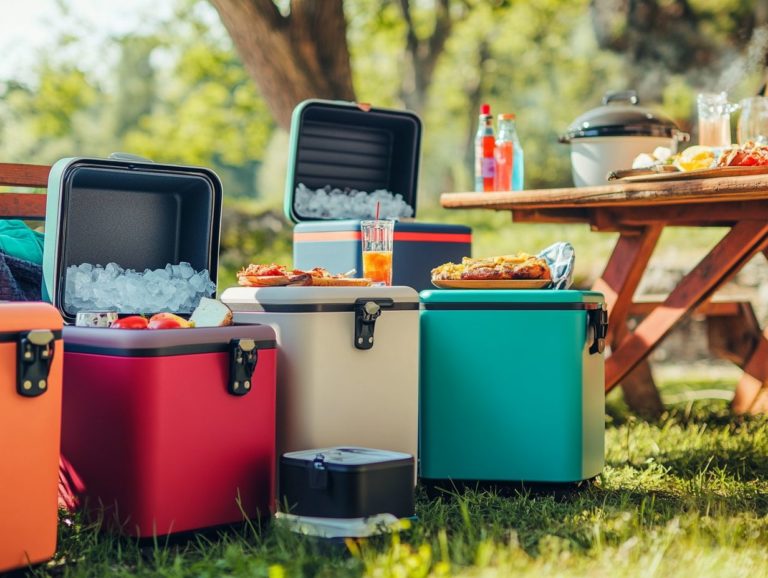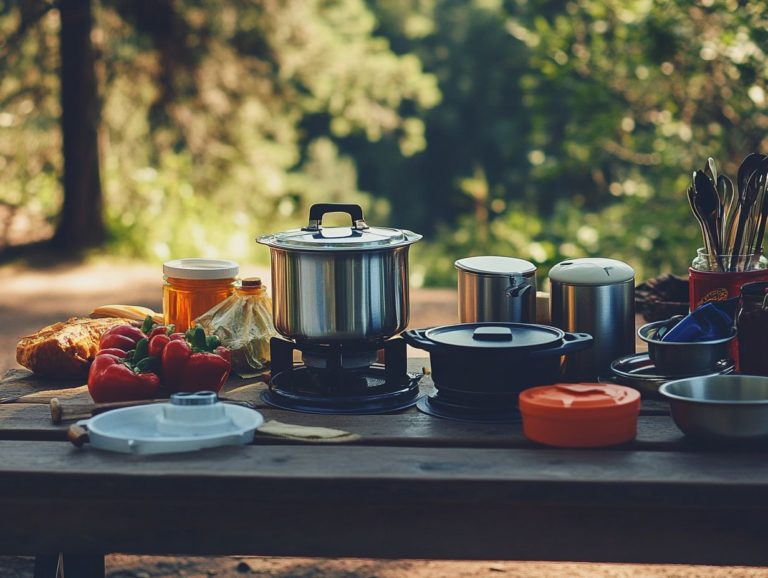How to Maintain Your Outdoor Cooking Equipment
Outdoor cooking offers a fantastic opportunity to savor delicious meals amidst nature. Keep your equipment in prime condition for safety and best performance.
This guide explores different types of outdoor cooking gear and shares the best practices for cleaning and maintenance. You ll learn effective cleaning techniques, maintenance tips, and proper storage methods.
It also addresses common issues and provides troubleshooting solutions. Recognizing when to replace equipment can save you time, money, and frustration.
Whether you re an experienced grill master or just starting your culinary journey outdoors, this guide will ensure your cooking experience is seamless and enjoyable!
Contents
- Key Takeaways:
- Types of Equipment and Their Uses
- Cleaning and Maintenance of Outdoor Cooking Equipment
- Storing Outdoor Cooking Equipment
- Common Issues with Outdoor Cooking Equipment
- Replacing Outdoor Cooking Equipment
- Frequently Asked Questions
- What is considered outdoor cooking equipment?
- How often should I clean my outdoor cooking equipment?
- What is the best way to clean my outdoor cooking equipment?
- How can I make my outdoor cooking equipment last longer?
- What should I do if my outdoor cooking equipment gets rusted?
- Do I need to maintain my outdoor cooking equipment?
- Key Takeaways
Key Takeaways:
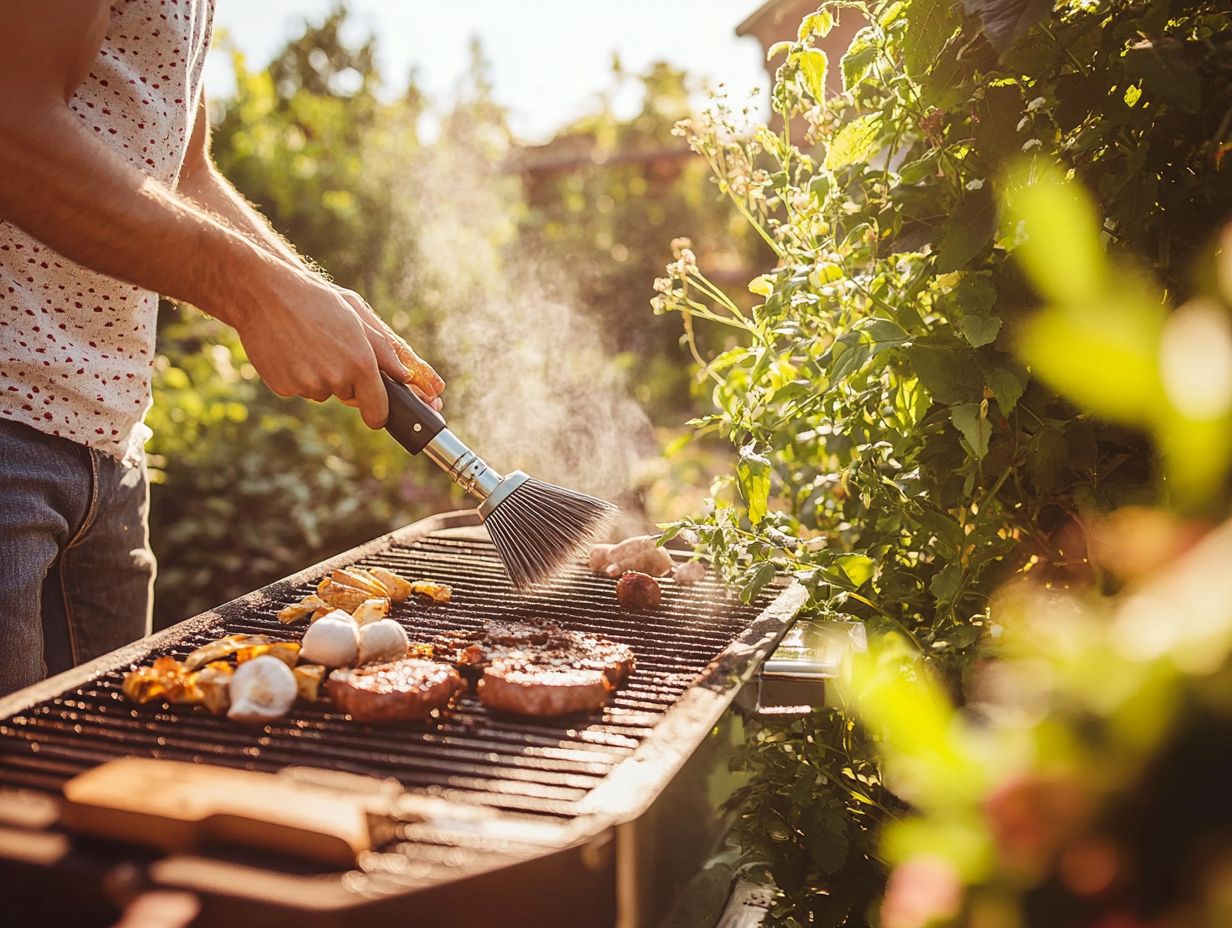
- Regular cleaning and maintenance are crucial for the long life and efficiency of your outdoor cooking equipment.
- Storing equipment properly, like covering it and keeping it in a dry area, prevents damage and extends its lifespan.
- Understanding common issues and when to replace old equipment saves you time, money, and frustration!
Types of Equipment and Their Uses
Outdoor cooking involves various equipment that serves unique purposes. From kitchens perfect for summer gatherings to tools like gas grills, pizza ovens, and outdoor refrigerators, each piece significantly enhances the experience.
Take Blackstone griddles, for example. They offer versatile cooking techniques that cater to various tastes, making them a favorite among outdoor cooking fans! Understanding each type’s functions enhances your outdoor cooking experiences.
Cleaning and Maintenance of Outdoor Cooking Equipment
Cleaning and maintaining your outdoor cooking equipment is crucial for long life and best performance, especially if you host frequent summer gatherings. To enhance your setup, consider checking out how to organize your outdoor cooking gear.
Regular upkeep boosts durability and enhances safety during outdoor cooking adventures.
Incorporating effective cleaning practices and using covers that protect can significantly extend the lifespan and functionality of your outdoor kitchen space.
Proper Cleaning Techniques
Using the right cleaning techniques is essential for maintaining the look and function of outdoor kitchens, especially those with stainless steel appliances and granite countertops.
Effective cleaning keeps surfaces free from food waste and grime, elevating your outdoor cooking experience. A few specific tips and knowing what equipment you need for outdoor cooking can greatly impact your kitchen’s upkeep!
For stainless steel, use a gentle cleaner intended for that material. This achieves a streak-free shine while avoiding abrasive pads that scratch the surface.
For granite countertops, choose a cleaner that doesn t alter the acidity level to maintain their beautiful finish. Avoid harsh chemicals that could dull the surface over time.
For concrete surfaces, a simple mix of soap and water effectively removes dirt, while a pressure washer can handle tough stains. Regularly maintaining your outdoor kitchen with these tailored techniques keeps it looking pristine and extends the life of these beautiful materials.
Regular Maintenance Tips
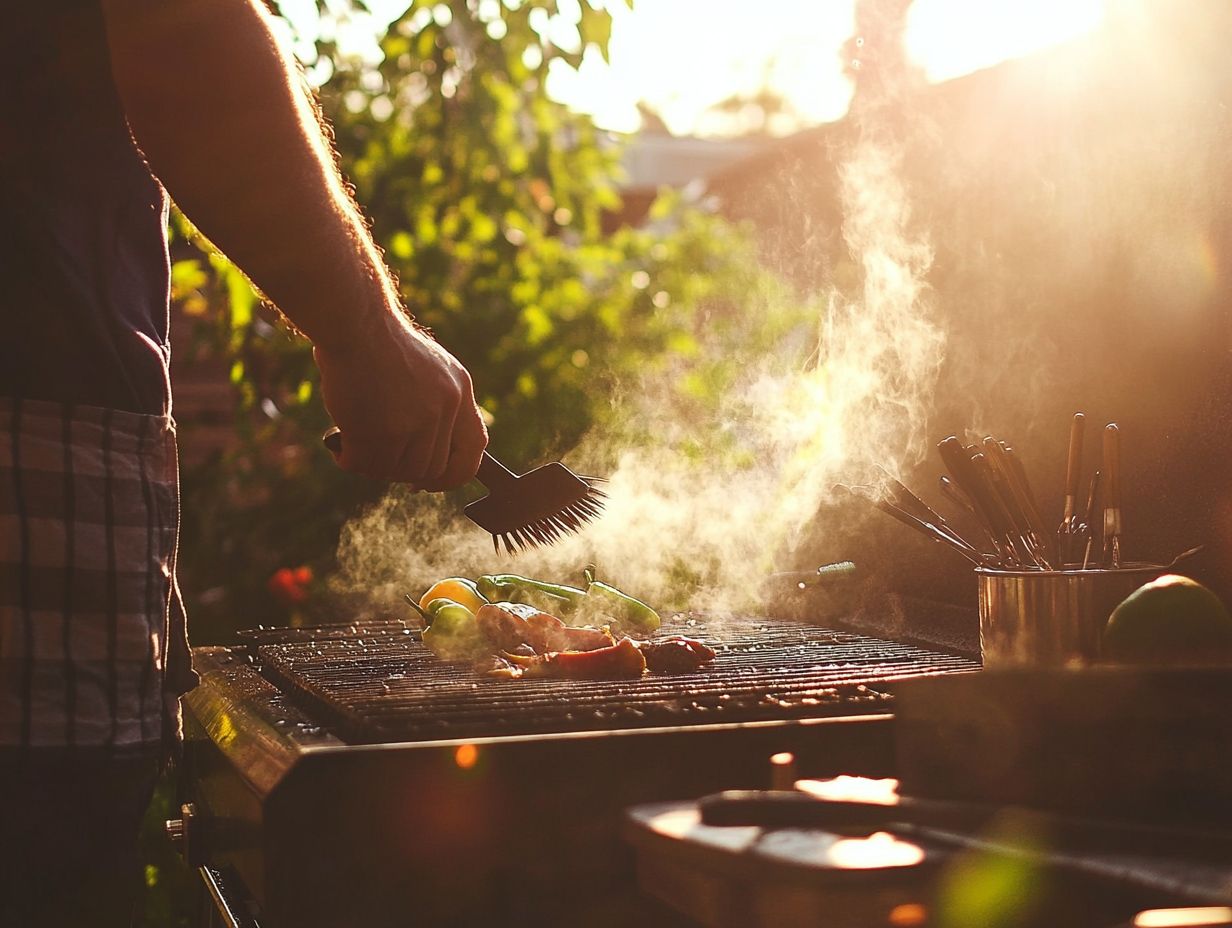
Implementing regular maintenance tips is crucial for ensuring the longevity and optimal performance of your outdoor cooking appliances. This is especially true for gas grills and outdoor refrigerators, as well as smokers. Learning how to maintain your smoker for longevity can help you establish a scheduled maintenance plan, preventing costly repairs and keeping your outdoor cooking space in top-notch condition.
Simple tasks, like checking gas connections and cleaning the ice maker, play a significant role in the preventative maintenance of these essential outdoor kitchen components. These small upkeep tasks enhance the safety and reliability of your equipment while improving your overall cooking experience.
For instance, cleaning the grill grates regularly prevents grease buildup, which can compromise flavor and introduce fire hazards. For outdoor refrigerators, defrosting and monitoring temperature settings are vital to avoid spoilage.
Engaging professional repair services can provide you with expert insights, ensuring that each appliance functions correctly and efficiently. Taking action early helps identify potential issues, allowing you to enjoy your outdoor kitchen with complete peace of mind.
Storing Outdoor Cooking Equipment
Properly storing your outdoor cooking equipment is crucial for maintaining its condition and ensuring that your outdoor kitchen remains functional throughout the year. By following guidelines on how to prepare for safe outdoor cooking experiences, you can extend the lifespan of your durable appliances and shield them from the elements.
Using protective covers and organizing your outdoor cooking space makes it both practical and visually appealing, enhancing its natural charm.
Best Practices for Storage
Adopting best practices for storage can significantly enhance the performance and lifespan of your outdoor kitchen equipment. This is especially important during less-than-ideal weather conditions. For those using cast iron cookware, knowing how to safely use cast iron cookware outdoors is crucial. Utilize protective covers for your gas grills and pizza ovens, and ensure that your stainless steel appliances are safely stowed away when not in use.
By implementing effective storage strategies, you’re safeguarding your equipment and preserving the aesthetic appeal of your outdoor cooking space. Organizing your outdoor kitchen efficiently can make a remarkable difference in usability.
Designating specific areas for each appliance facilitates access and minimizes the wear and tear from constant movement. Incorporating shelving units or cabinets offers dedicated spaces for your smaller tools and gadgets, keeping them tidy and shielded from the elements.
With each covered appliance able to breathe freely, dirt and debris are kept at bay, enabling smoother operation and extending performance longevity. Regularly checking these areas allows you to address any wear promptly, ensuring your outdoor kitchen remains in optimal condition and ready for your outdoor entertaining.
Common Issues with Outdoor Cooking Equipment
Identifying common issues with outdoor cooking equipment is essential for maintaining the functionality of your outdoor kitchen and ensuring safe cooking experiences. From loose gas connections to malfunctioning ice makers, recognizing these problems early can save you both time and money on repairs.
Troubleshooting these issues enhances your outdoor cooking efficiency and guarantees that your appliances are always primed for summer entertaining. Don t wait until it s too late! Addressing these issues early can save you time and stress during your summer parties.
Troubleshooting and Solutions
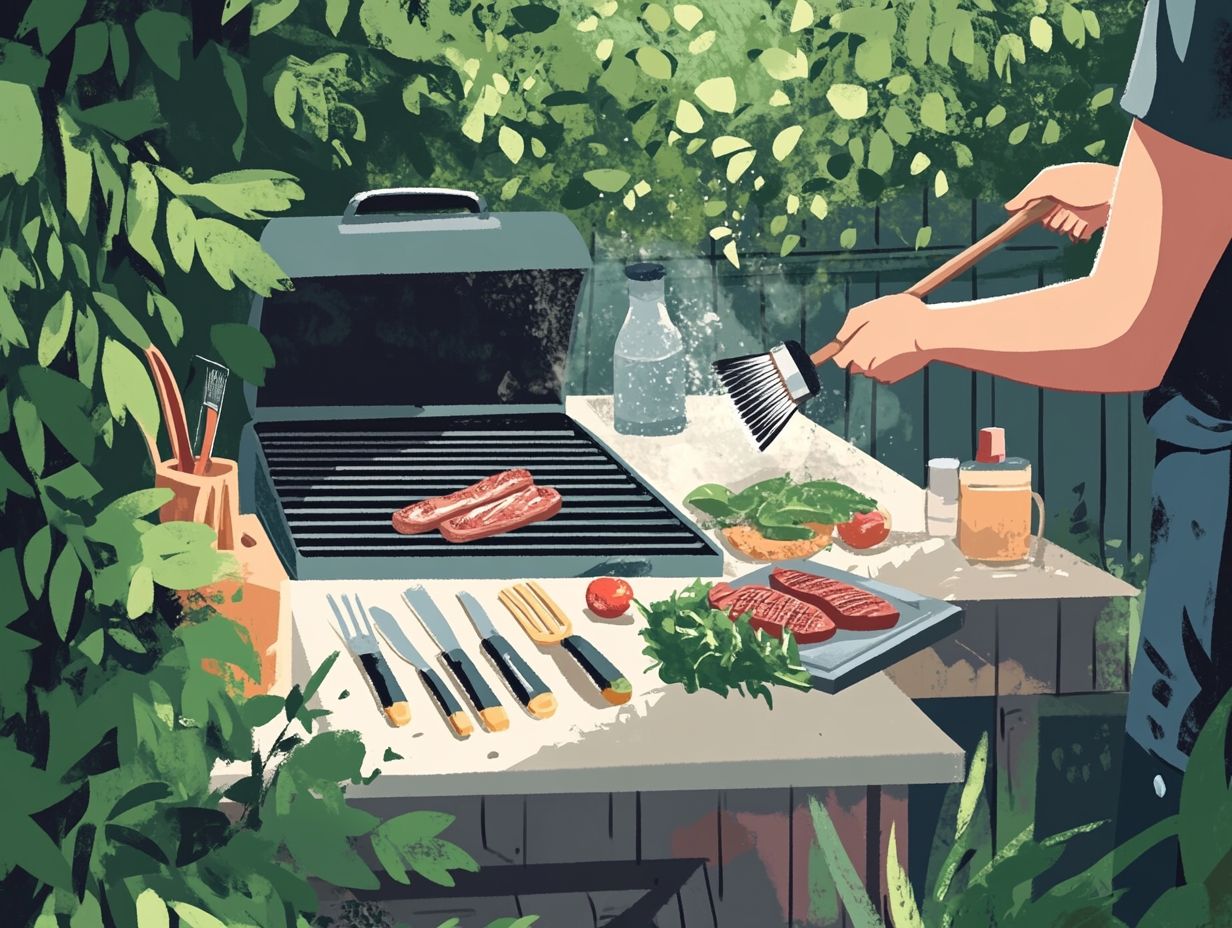
Troubleshooting outdoor kitchen equipment demands a systematic approach to efficiently identify and resolve issues. This ensures that everything from your gas grill to pizza ovens operates at peak performance.
Common troubleshooting scenarios include checking gas lines for leaks and confirming that your outdoor refrigerator is cooling properly. Implementing a maintenance plan can help you address many of these issues in advance, reducing the frequency of appliance repairs.
Regularly inspecting your appliances and performing routine maintenance can significantly extend their lifespan. Start by crafting a checklist that covers essential tasks such as:
- Cleaning grease traps and following grilling tips to enhance your cooking experience.
- Checking for rust on grills.
- Replacing water filters for any outdoor ice makers or refrigerators.
Properly storing appliances during the off-season is crucial to protect them from harsh weather conditions. Additionally, following the top 10 safety tips for outdoor cooking equipment can further enhance performance and minimize costly repairs, making your outdoor cooking experience more enjoyable and stress-free.
Replacing Outdoor Cooking Equipment
Understanding when to replace your outdoor cooking equipment is crucial for maintaining both the efficiency and safety of your outdoor kitchen. To ensure you’re cooking safely, consider following essential tips for outdoor cooking. Outdated or malfunctioning appliances can hinder your culinary experiences.
Some common signs that it s time for a replacement include:
- Frequent breakdowns.
- A noticeable decline in performance.
Another indicator is an inability to fulfill your cooking preferences, like when using a Blackstone griddle or outdoor refrigerator.
By identifying these indicators early on, you can confidently choose the best options for your outdoor kitchen design, ensuring that your appliances serve you well for years to come.
Signs for Replacement
Identifying the signs that it’s time to replace your outdoor cooking equipment is vital for maintaining optimal performance and safety in your outdoor kitchen. For more information on this topic, check out how to test outdoor cooking gear durability.
For example, if you spot any corrosion or notice that the burners are producing uneven flames, these aren t merely aesthetic concerns; they may create safety hazards that profoundly affect your cooking process. Your outdoor kitchen should be a sanctuary of enjoyment, not a source of anxiety.
If you’re detecting a persistent gas odor or hearing unusual noises from your appliances, it could signal deeper mechanical issues. Don t wait until it’s too late!
By recognizing these warning signs early, you can avert potential accidents and ensure an efficient cooking environment allowing you to entertain guests with confidence and peace of mind.
Choosing the Right Replacement Equipment
When selecting replacement equipment for your outdoor kitchen, consider not just the performance of the new appliances, but also how they fit with your cooking preferences and the overall design of your space.
Think about factors like size, style, and functionality they should be your guiding stars in the decision-making process, ensuring that your new additions beautifully complement your outdoor cooking oasis.
The right choices will elevate your outdoor culinary experiences and perfectly align with your culinary passions. Compatibility with existing features, whether it s countertops, grills, or cabinetry, is vital for maintaining a cohesive aesthetic.
Reflect on the types of meals you love to create. Whether you re into grilling, smoking, or baking, each style may require different equipment.
Durability of materials is another important consideration, especially if you live in an area with unpredictable weather. Ensure your choices can withstand the elements while still performing beautifully.
Striking a careful balance of these factors will lead to an outdoor cooking atmosphere that is not only efficient but also thoroughly enjoyable.
Frequently Asked Questions
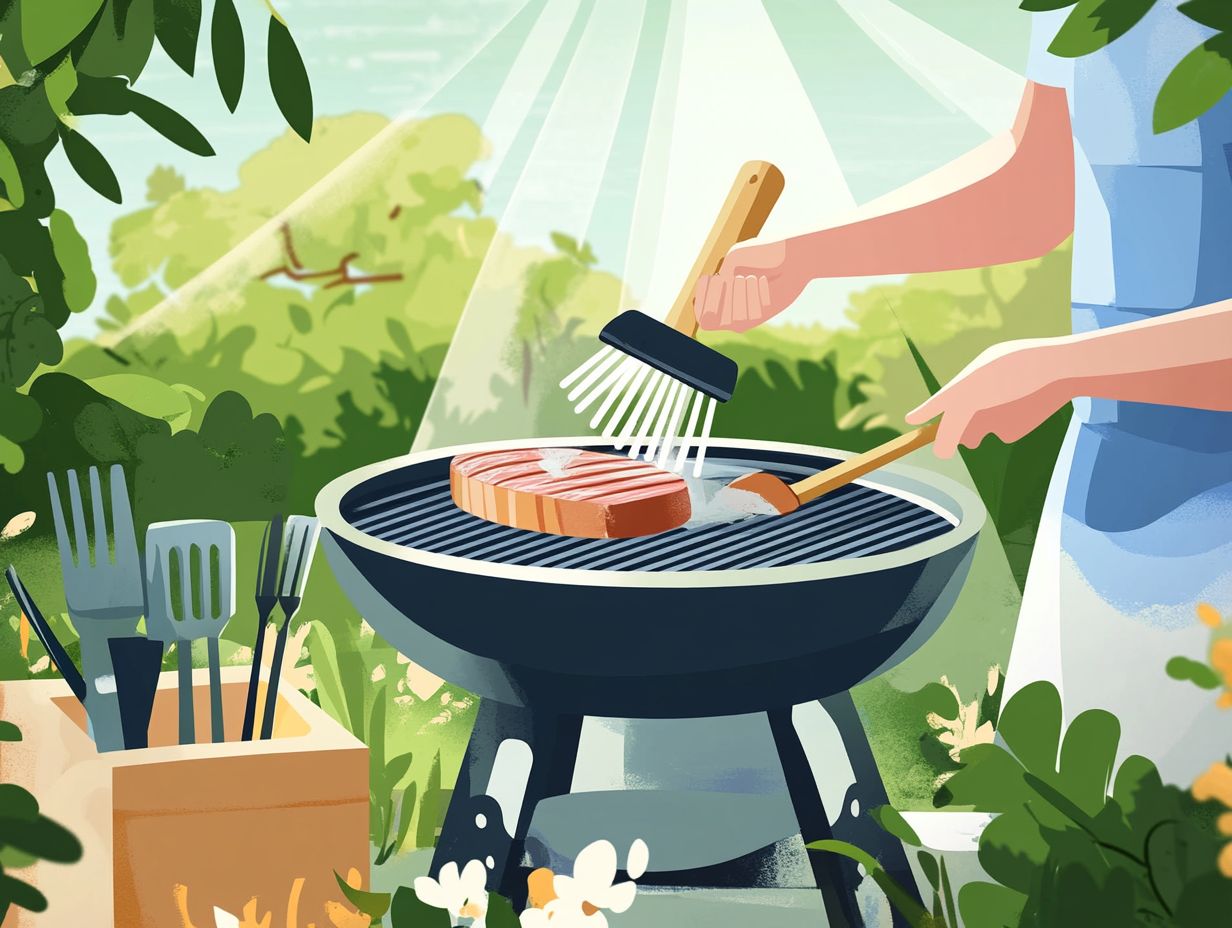
If you have more questions, feel free to reach out or explore further resources on outdoor cooking maintenance!
What is considered outdoor cooking equipment?
Outdoor cooking equipment includes items like grills, smokers, outdoor stoves, and fire pits. These tools are perfect for cooking food outside.
How often should I clean my outdoor cooking equipment?
Clean your outdoor cooking gear after each use. This keeps grease and food buildup at bay!
What is the best way to clean my outdoor cooking equipment?
Mix hot water with mild dish soap to clean your gear. Scrub with a soft brush or cloth, then rinse well.
How can I make my outdoor cooking equipment last longer?
To make your equipment last, clean and dry it thoroughly after each use. Cover or store it in a dry spot when it’s not in use to shield it from the elements.
What should I do if my outdoor cooking equipment gets rusted?
If rust appears, use a wire brush to scrub it off. Then, apply cooking oil to prevent more rust from forming.
Do I need to maintain my outdoor cooking equipment?
Yes! Regularly check for worn or damaged parts. Replace them as needed to keep your equipment safe and efficient.
Key Takeaways
- Clean after each use for the best results.
- Use hot water and mild soap for cleaning.
- Store in a dry location to prolong life.
- Check and replace damaged parts regularly.
Ready to fire up your grill? Don t forget to clean it first for the best cooking experience!

